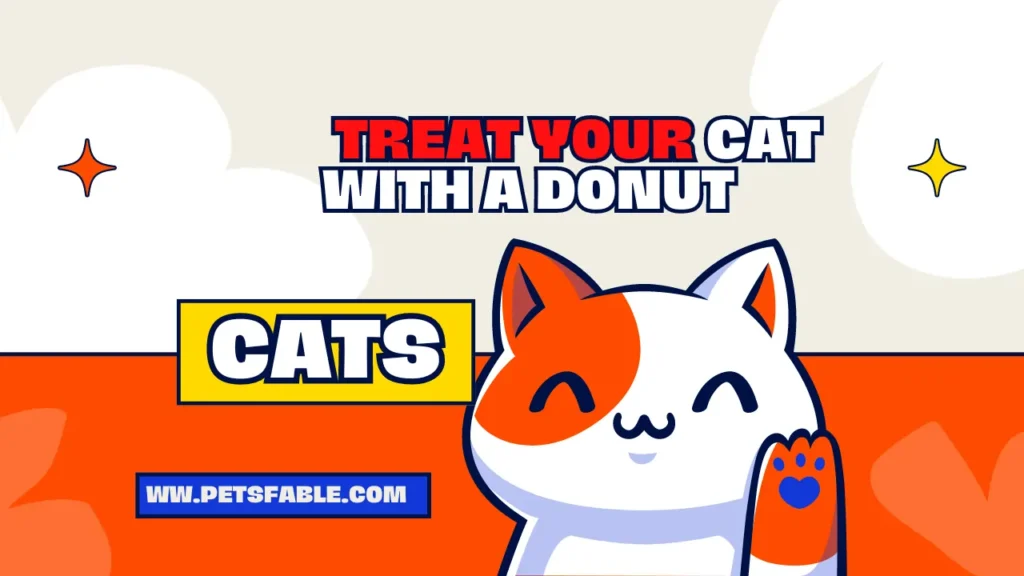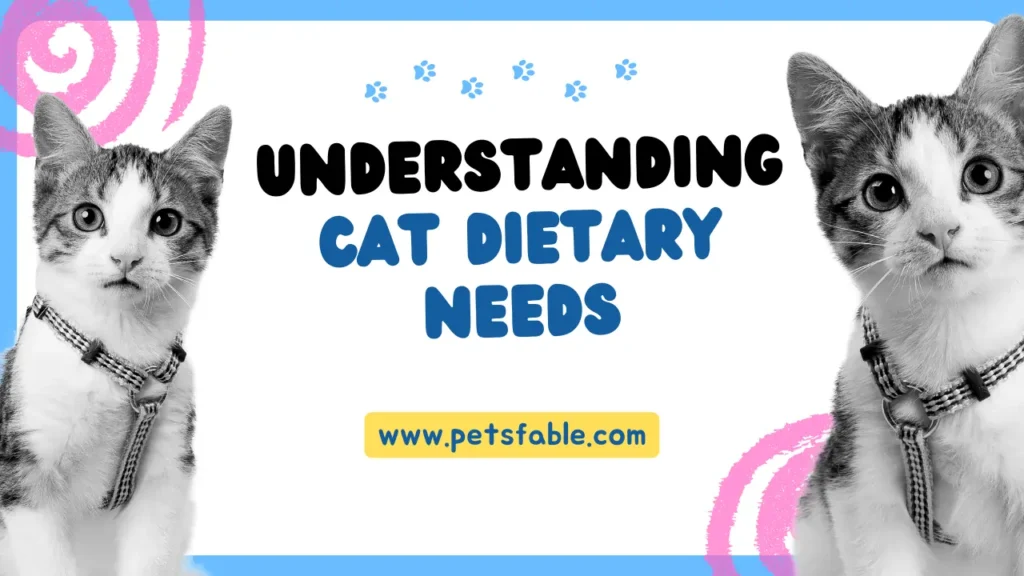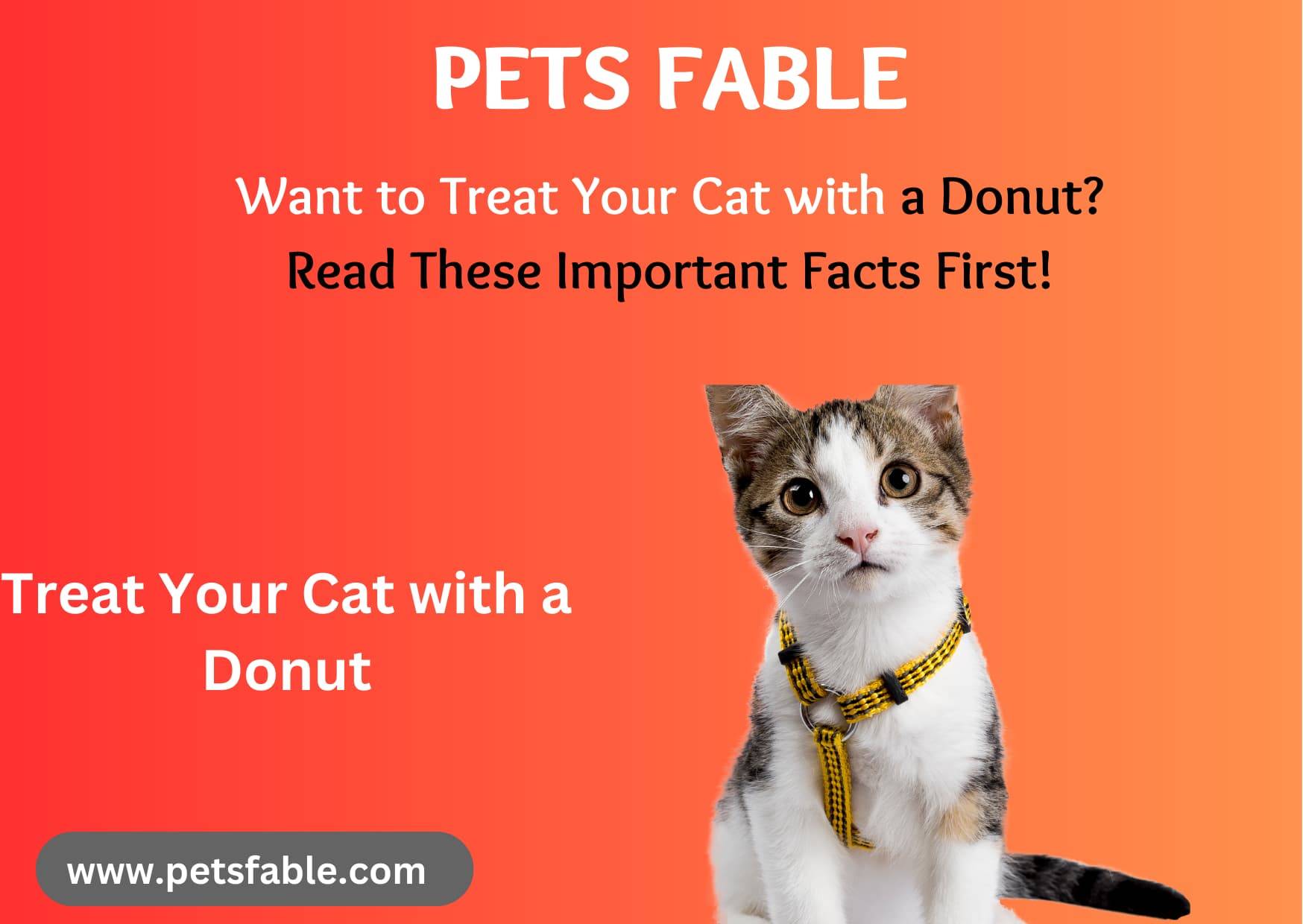Why a Bad Idea Treat Your Cat with a Donut
Feeding your Treat Your Cat with a Donut might be tempting, especially when they beg for a bite, but it's important to resist. Donuts lack the essential nutrients cats need and are high in sugars and fats, which are detrimental to their health.
Even plain donuts, while not toxic, can contribute to long-term health issues such as obesity when given regularly.Healthier Alternatives for Your Cat
Instead of sugary treats like donuts, opt for cat-specific snacks that fulfill their dietary requirements. It’s particularly crucial to steer clear of glazed or filled donuts, which can pose additional health risks to your cat.
Offering treats made specifically for cats ensures they enjoy a tasty snack without compromising their health.
Cats and Donuts: A Risky Combination
While cats’ curiosity might lead them to explore various foods, including donuts, it’s important to understand the risks involved. Donuts are high in sugar and fats, which are not only unhealthy but can also lead to serious health issues for cats if consumed regularly.
Given their lack of nutritional value for felines, sticking to cat-specific treats is advisable.
Nutritional Downfalls of Donuts

Donuts are known for being high in oil, sugar, and flour, ingredients that contribute to their minimal nutritional value.
This lack of essential nutrients is harmful not just to humans but to cats as well, particularly because some toppings can be hazardous to their health.
Read more: Think-chihuahuas-are-meanDo Cats Actually Like Donuts?
Cats are obligate carnivores, requiring a diet primarily made up of meat. Here’s why they might show interest in donuts:
- Natural Curiosity: Cats naturally explore their environment, which can include sniffing and licking non-meat items like donuts.
- Lack of Sweet Taste: Cats lack the taste receptors for sweetness, so their interest in donuts isn’t due to the sugar.
- Attraction to Oil: The smell and texture of the oil in donuts can attract cats, though they typically lose interest once they realize there’s no meaty flavor.
Health Implications for Cats Eating Donuts
While a cat might initially be drawn to a donut, especially if driven by hunger, these treats offer no nutritional benefits and pose health risks.
The high fat and sugar content can be particularly harmful, making donuts an unsuitable choice for cats.
Conclusion: Treat Your Cat with a Donut

Ultimately, while cats might interact with donuts out of curiosity, these foods are inappropriate for their dietary needs.
To ensure the health and well-being of your cat, it is best to provide treats that are specifically formulated for their carnivorous diet.
Overview of Health Risks from Donuts for Cats
Feeding donuts to cats, even in small amounts, poses several health risks. It’s important to understand why these common human treats are not suitable for feline consumption.
Sugar Content:
Donuts typically contain between 15 to 30 grams of sugar. Cats have a limited ability to process sugars, which can lead to serious health issues.
Digestive Problems:
While a small bite might not immediately harm your cat, regular or large consumption can cause vomiting and diarrhea.
Read more: Health Risks from Donuts for CatsTypes of Donuts:
Plain donuts carry fewer risks compared to other varieties, but it is generally advisable to avoid giving any type of donut to cats.
Increased Health Risks:
Glazed or specially flavored donuts are particularly harmful because they contain higher levels of sugars and potentially hazardous toppings like sprinkles.
Toxic Ingredients:
Certain ingredients commonly found in donuts, such as chocolate, cinnamon, and nutmeg, are toxic to cats and can be harmful even in small quantities.
What do I do If my Cat Ate the Donut?
This concise guide helps highlight the potential dangers of feeding donuts to cats and the steps to take if adverse effects are observed.
Occasional Taste:
A small bite of a donut usually isn’t harmful, but consuming the entire treat could be concerning.
Lack of Sweet Tooth:
Cats naturally do not crave sweets, so they are unlikely to beg for more donuts after trying one.
Health Impact:
Despite their indifference to the taste, donuts can still adversely affect a cat’s health.
Signs of Distress:
Watch for symptoms like vomiting, diarrhea, or severe lethargy. These could be signs that your cat has ingested something harmful.
Immediate Actions:
If your cat exhibits unusual behaviors, such as a different meowing tone, it’s crucial to consult a veterinarian promptly as these could indicate severe health issues.
Reconsider Feeding Your Cat a Donut: What You Need to Know
The Drawbacks of Treat Your Cat with a Donut
While it may be tempting to share your snack with your curious cat, donuts pose significant health risks to them. Donuts are high in sugar and fats, lacking the essential nutrients that cats require.
Even occasional indulgence in a homemade donut can lead to long-term health issues such as obesity and digestive troubles.
Understanding Cat Dietary Needs

Cats are carnivores and their diet should primarily consist of meat. They lack the ability to taste sweetness and are naturally drawn to savory flavors. Despite this, the enticing aroma of fried donuts might pique their interest.
However, the sugar, fats, and oils in donuts offer no nutritional benefits and can even be harmful, particularly if the donuts contain chocolate or other toxic ingredients like cinnamon and nutmeg.
Healthier Alternatives for Treat Your Cat with a Donut
Instead of sweets like donuts, provide your cat with high-quality commercial cat food and treats designed specifically for their dietary needs.
If you wish to offer a special treat, consider small amounts of boiled meat or safe dehydrated snacks that are more in line with their natural diet.
The Dangers of Common Donut Ingredients
- Sugar and Fat: Excessive sugar and fats can lead to obesity, diabetes, and other serious health problems in cats.
- Chocolate: Often found in donuts, chocolate is toxic to cats and can cause severe health issues.
- Dough and Oil: Uncooked dough can expand in a cat’s stomach, causing pain and blockages, while the oils used for frying are difficult for cats to digest and can lead to gastrointestinal distress.
- Dairy Products: Many cats are lactose intolerant, and consuming dairy can lead to digestive upset.
- Artificial Flavors and Toppings: Many artificial flavors and common toppings like sprinkles and whipped cream can be harmful to cats.
Why It’s Important to Keep Donuts Away From Cats
Given their lack of nutritional value and potential to contain harmful ingredients, it’s crucial to keep donuts and similar treats out of your cat’s reach. Cats do not need sugary or highly processed foods, which can only do more harm than good.
Final Thoughts: Ensuring Your Cat’s Health
Always prioritize your cat’s health by keeping their diet appropriate to their species. Consult your vet for recommendations on safe treats and diet adjustments to ensure your feline friend remains healthy and happy. Remember, what is tasty to you can be dangerous for your pet.
Read more: Treat Your Cat with a DonutFAQs: Treat Your Cat with a Donut
Can cats have Dunkin donuts? Treat Your Cat with a Donut
While donuts aren’t inherently toxic, they can upset a cat’s stomach, potentially causing nausea, vomiting, or diarrhea. Cats may show nausea through increased drooling or a lack of appetite. It’s important to monitor your cat closely if they eat anything unusual for their diet.
Can cats eat glazed donuts? Treat Your Cat with a Donut
Glazed donuts are not suitable for cats. The high sugar and fat content in these treats can lead to digestive problems such as vomiting and diarrhea. It’s best to keep such foods well out of your cat’s reach.
Can donuts kill cats ?Treat Your Cat with a Donut
While donuts are unlikely to be fatal, they can cause significant health problems for cats, including digestive upset from the high sugar and fat content. To prevent any risk to your cat’s health, it’s advisable to avoid feeding them donuts.
Can Treat Your Cat with a Donut?
Powdered donuts should be avoided for cats. The sugar and additives in these treats can lead to digestive issues, such as vomiting and diarrhea, and they provide no nutritional value.
Conclusion
Feeding your cat donuts can lead to various digestive problems and provides no nutritional benefit. Although a small piece of a donut might not immediately harm your cat, it’s best to avoid such treats altogether.Stick to cat-specific foods that cater to their dietary needs and keep human snacks out of reach to ensure your cat stays healthy and happy.
